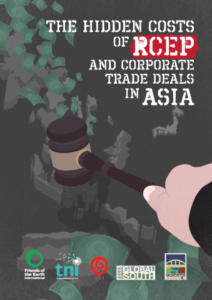08/12/2016
Under: Publications, Trade and Investment
“The RCEP and the TPP are both extensions of the WTO framework – designed to concentrate wealth in the hands of global corporate elites. Neither the US-led TPP nor the China-led RCEP will address the long-standing demand for an international trading system that responds to people’s needs”
Beverly Longid, from the International Indigenous Peoples Movement for Self-Determination and Liberation.[2]
RCEP also includes the controversial Investor-State Dispute Settlement mechanism (ISDS), which is facing increasing public criticism and scrutiny worldwide.[3] ISDS is a one-way mechanism that empowers foreign investors to sue the state at international arbitration tribunals; it cannot be used by states. Foreign investors can circumvent domestic court systems and claim financial compensation from host governments in secret business-friendly international tribunals, if they deem their investments (including their potential future profits) are adversely affected by the introduction of regulatory and/or policy changes in the host state. These private tribunals are comprised of three for-profit arbitrators, who issue their decisions behind closed doors. Arbitrators often have serious conflicts of interest[4], as many have financial incentives to rule in favour of the investor and keep the system alive. Arbitrators also often switch sides and go on to work as counsels, representing and defending the companies filing investment treaty cases.
Negotiating new treaties that include ISDS runs counter to the decision by some governments in the region to reform or terminate these agreements in order to protect their right to regulate. Among RCEP countries, India, Indonesia and Australia have undergone review processes of the international investment framework. In the case of India[5] and Indonesia[6], the outcomes of the reviews have led to the termination of several treaties as well as the development of new model bilateral investment treaties (BITs) that highly restrict the rights of investors.
This report highlights the current and potential costs of ISDS to countries negotiating the RCEP agreement. The North American Free Trade Agreement (NAFTA) shows that mega regional trade deals are much harder to reform or change after ratification than bilateral agreements. The only way to roll back the rights granted to investors in free trade agreements is is by terminating the entire treaties, not just their respective investment protection chapters. The dangerous impacts of investment treaties are likely to increase if governments in the region agree to grant far-reaching protection rights to investors in RCEP and other ongoing free trade negotiations. Furthermore it can reasonably be expected that RCEP would lock in the dangerous ISDS provision in the region for the foreseeable future. This would undermine governments’ efforts to safeguard their right to regulate in the public interest.
Claims for compensation can – and do – amount to billions of dollars. However, ISDS cases are not fully disclosed to the public even when cases may relate to matters of public interest, such as the environment. When the state loses an ISDS case or settles a dispute with an investor, governments can be forced to foot the bill with public money. In other words, ISDS effectively allows foreign investors to pass their investment risks on to citizens and public budgets. Even when cases have been discontinued or when the outcome is said to be ‘in favour of the state’, the state will usually have to bear the exorbitant cost of legal defence and arbitrators’ fees. According to the Organisation for Economic Cooperation and Development (OECD) estimates, expenses for a single ISDS case amount to US$8 million on average for legal and arbitration fees alone, half of which will be footed by the State.[7]
This report compiles available data on ISDS cases taken against countries party to the RCEP negotiations. The report highlights the ongoing corporate attack on Asian governments’ right to regulate, including actions following the introduction of measures to protect the environment. It also underlines the costs that this system has already had to democracy in the region.
Authors Cecilia Olivet, Kat Moore, Sam Cossar-Gilbert, Natacha Cingotti
Design Somerset Bean
Published by Friends of the Earth International, Transnational Institute, Indonesia for Global Justice, Focus on the Global South, and Paung Ku
Amsterdam/Jakarta, December 2016
[1] Australian government (2016) Regional Comprehensive Economic Partnership, Department of Foreign Affairs and Trade http://dfat.gov.au/ trade/agreements/rcep/Pages/regional-comprehensive-economic-partnership.aspx
[2] Asia Pacific Research Network (2016) Civil society groups reject RCEP: Excessive corporate power at the expense of people’s rights, APRN Newsletter, Second Quarter 2016, p. 2-3, http://aprnet.org/wp-content/uploads/2016/09/APRN-Newsletter-2Q-2016_ nal.pdf
[3] Criticisms have been raised in the context of several trade negotiations and agreements. For example: https://www.kent.ac.uk/law/isds_ treaty_consultation.html ; http://www.citizen.org/documents/isds-law-economics-professors-letter-Sept-2016.pdf ; http://www.ohchr.org/ FR/NewsEvents/Pages/DisplayNews.aspx?NewsID=16031&LangID=E ; http://www.s2bnetwork.org/wp-content/uploads/2016/10/Canadian- academics-open-letter-on-the-CETA-and-Wallonia.pdf ; http://www.s2bnetwork.org/isds-statement-feb2016/
[4] Pia Eberhardt and Cecilia Olivet (2012) Pro ting from Injustice, Corporate Europe Observatory and Transnational Institute, https://www.tni.org/ en/brie ng/pro ting-injustice
[5] Both Ends (2016) India Terminates Bilateral Investment Treaties (BITS), 11th August, http://www.bothends.org/en/News/Laatste-nieuws/ newsitem/469/India-terminates-bilateral-investment-treaties-BITs-
[6] Herbert Smith Freehills Dispute Resolution (2015) Indonesia announces renegotiation of BITs, 13th May, http://hsfnotes.com/ arbitration/2015/05/13/indonesia-announces-renegotiation-of-bits/
[7] D. Gaukrodger and K. Gordon (2012) Investor-State Dispute Settlement: A Scoping Paper for the Investment Policy Community, OECD Working Papers on International Investment, 2012/03, OECD Publishing, page 19, http://dx.doi.org/10.1787/5k46b1r85j6f-en




![[IN PHOTOS] In Defense of Human Rights and Dignity Movement (iDEFEND) Mobilization on the fourth State of the Nation Address (SONA) of Ferdinand Marcos, Jr.](https://focusweb.org/wp-content/uploads/2025/07/1-150x150.jpg)

